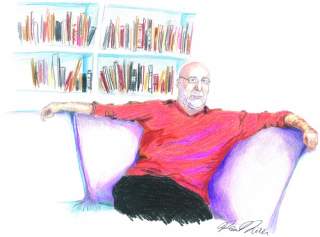Tony Judt’s Journey
Tony Judt’s When the Facts Change offers a valuable opportunity to survey his intellectual odyssey. Like all genuine historians, he spoke for the things he feared were vanishing.
Yet, in 1998, Judt approved of the Dayton Accords as a transparently generous undertaking; he spoke then of his incredulity at a Balkan intellectual who imputed to the United States a selfish motive: “The idea that the United States, or any other Western power, should have the remotest intention of ‘getting a foothold’ in the Balkans had never crossed my mind.” Why had it not crossed his mind? Getting a foothold is what great powers do for as long as they expand; they fear the loss of greatness if they stop expanding. A foothold was indeed obtained by the NATO bombing of Yugoslavia over eleven weeks in 1999, and it resulted in the erection of Camp Bondsteel—today the largest U.S. base in the Balkans, and an asset that has been used to hide detainees in the war on terror.
Nor has the search for a foothold ever slackened. The Obama administration went to war in Libya, escalated the drone war, started a new military campaign in Iraq and Syria, and is currently weighing direct military assistance to Ukraine. Despite the transition from Bush to Obama, there is scant evidence that the underlying aims of American foreign policy have changed in the passage from an “extreme” Republican to a “moderate” Democratic presidency. As the original Wolfowitz Doctrine, enunciated in the 1992 “Defense Planning Guidance,” put it in the aftermath of the Gulf War:
First, the U.S. must show the leadership necessary to establish and protect a new order that holds the promise of convincing potential competitors that they need not aspire to a greater role or pursue a more aggressive posture to protect their legitimate interests. Second, in the non-defense areas, we must account sufficiently for the interests of the advanced industrial nations to discourage them from challenging our leadership or seeking to overturn the established political and economic order. Finally, we must maintain the mechanisms for deterring potential competitors from even aspiring to a larger regional or global role.
Between a common sense that favors diplomacy and the expansionist vision outlined above by Wolfowitz, it is the latter that has emerged as the dominant force in American policy.
TONY JUDT’S driving affections come out in this book in his eulogies for Amos Elon, Furet and Kolakowski, all of whom he admired for reasons inseparably intellectual and moral. The essays collected here, in sum, testify to Judt’s attachment to a whole way of life, a climate of feeling he once took for granted but which he saw receding. It may be characterized as the way of life made possible by the European Enlightenment of the eighteenth century, and brought into practical politics by the extension of the franchise in the nineteenth century. The ethic of freedom, solidarity and gradual improvement, on which Hume and Mill and Tocqueville and Benjamin Constant agreed, still seems to embody for Judt the best of the human inheritance. Yet he was not fond of looking back. The most laudable exertions of the twentieth century, as he saw it, partook of the same idealism; the results are visible all around and they have earned our gratitude. Judt has in mind the understanding of human and social dignity on which the welfare state is based, and the invention of the modern city as a place of civil relations among friends and strangers. Unfashionably for a Western academic, Judt in his last years came to regard the United Nations as the strongest hope for preserving a residue of that idealism. He believed that for all its tangle of bureaucracy and its wars of prestige between the small, medium and big shoulders in the world of nations, the UN offered the only possible agency for international understanding and relief of the disasters brought by global warming.
When it came to picking a personal touchstone to suggest the value of modern life to him, Judt chose a thing so incidental that most people would hesitate to assign it a spiritual value. Two lovely and unexpected essays in When the Facts Change are given to a celebration of the railway system of Europe. It seems to him one of the glories of modern life; on this subject, Judt is uninhibited. He praises the 1946 postwar movie Brief Encounter, a romantic melodrama set in a drab provincial station, and to account for its glamour he points to “the transcendent authority of the timetable, the configuration of the station and its location in town and community, the physical experience and plot significance of steam and cinders,” all the phenomena of the modern setting which for the characters “represent risk, opportunity, uncertainty, novelty, and change.” Life is lived for the sake of such things, he supposed, and like all genuine historians, he spoke for the things he feared were vanishing.
David Bromwich is Sterling Professor of English at Yale University. He is the author of The Intellectual Life of Edmund Burke: From the Sublime and Beautiful to American Independence (Belknap Press, 2014).
Image: Rebecca M. Miller

